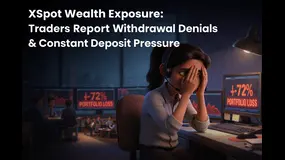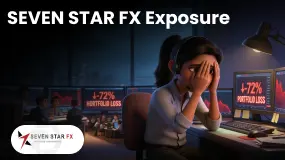WikiFX Spring Festival Message | Grounded in Transparency, Walking with Trust
As the Lunar New Year approaches, renewal is in the air. It is a moment to bid farewell to the old, welcome the new, and reflect while moving forward.
简体中文
繁體中文
English
Pусский
日本語
ภาษาไทย
Tiếng Việt
Bahasa Indonesia
Español
हिन्दी
Filippiiniläinen
Français
Deutsch
Português
Türkçe
한국어
العربية
Abstract: Let us now turn our attention to the first item of discussion for today: the central bank of Nigeria formally announced the commencement of the RT200 FX program in an effort to gain 200 billion dollars in FX repute over the following three to five years. The Rt200 forex program is based on the background value of increasing export facilities, non-oil commodity expansion facilities, and by on or non-all export summits. This strategy is projected to boost and weaken the supply side of the foreign exchange market, which is more important and influential than demand management involvement in the foreign exchange market.

Let us now turn our attention to the first item of discussion for today: the central bank of Nigeria formally announced the commencement of the RT200 FX program in an effort to gain 200 billion dollars in FX repute over the following three to five years. The Rt200 forex program is based on the background value of increasing export facilities, non-oil commodity expansion facilities, and on or non-all export summits. This strategy is projected to boost and weaken the supply side of the foreign exchange market, which is more important and influential than demand management involvement in the foreign exchange market.
According to Isaiah Ndukwe, Head of Export and Agric Firms at Fidelity Bank, the Central Bank of Nigeria's (CBN) new RT200 FX Policy would encourage more firms to export and encourage exporters to add value to the commodities they export.
He made the statements while speaking at a workshop organized by Fidelity Bank in Akure, Ondo State, themed “Harnessing Export Business Opportunities, CBN RT200 FX Policy: Policy Sensitization, Emerging Sector Issues, and Business Implications.”
Representatives from important players in Nigeria's financial services and export industries attended the event.
Representatives from the Nigerian Export and Import Bank (NEXIM), the Cocoa Exporters Association of Nigeria, and the Nigerian Export Promotion Council (NEPC) were also present.
In a statement issued by the Bank, he stated that the CBN's efforts to achieve $200 billion in Foreign Exchange (FX) repatriation from non-oil exports over the next five years had been further accelerated.
Ndukwe remarked that “Fidelity Bank is perfectly positioned to promote the CBN policy effort to minimize the country's dependency on oil income.”
He stated that the bank is committed to growing the export business in critical sectors of the economy by aiding exporters.
“The new policy will change exporters' thinking and inject value addition on their goods, allowing them to earn more cash,” he explained further.
“With the implementation of this strategy, the CBN has said that foreign currency supply to commercial banks would cease by the end of 2022, while investors will be able to create forex through the RT200 FX Program template, which has been developed to enhance commodities exports.”
The central bank established the RT200 FX Program on February 10, 2022, as part of an effort to restrict escalating demand for foreign currency by importers, with the goal of relieving excessive pressure on the exchange rate.
Babatunde Fatimiro, a cocoa farmer who attended the event, praised Fidelity Bank for the sensitization series, stating, “In Ondo State today, cocoa has a dedicated agency; this is rare in Nigeria.” When examining the potential, inclusive advantages, and economic impact of cocoa production on the Nigerian economy, I have no doubt that cocoa will overtake crude oil in terms of economic importance in Nigeria one day. Initiatives like Fidelity Bank's workshop will help us accomplish this quickly, and I encourage them not to give up on their efforts to diversify the economy.

Disclaimer:
The views in this article only represent the author's personal views, and do not constitute investment advice on this platform. This platform does not guarantee the accuracy, completeness and timeliness of the information in the article, and will not be liable for any loss caused by the use of or reliance on the information in the article.

As the Lunar New Year approaches, renewal is in the air. It is a moment to bid farewell to the old, welcome the new, and reflect while moving forward.

XSpot Wealth has found many negative comments from traders who have allegedly been deceived by the broker. Traders constantly accuse the broker of causing unnecessary withdrawal blocks and forcing them to continue depositing with it. Many user complaints emerged on WikiFX, a leading global forex regulation inquiry app. In this XSpot Wealth review article, we have investigated multiple complaints against the broker. Read on!

Did SEVEN STAR FX make unreasonable verification requests and block your forex trading account later? Did the broker prevent you from accessing fund withdrawals? Were you made to wait for a long time to receive a response from the broker’s customer support official? Have you had to seek legal assistance to recover your stuck funds? Well, these are some claims made by SEVEN STAR FX’s traders. In this SEVEN STAR FX review article, we have looked closely at the company’s operation, the list of complaints, and a take on its regulatory status. Keep reading to know the same.

When traders search for "Is ZarVista Safe or Scam," they want to know if their capital will be safe. Nice features and bonuses do not matter much if you can't trust the broker. This article skips the marketing talk and looks at real evidence about ZarVista's reputation. We want to examine actual user reviews, look into the many ZarVista Complaints, and check the broker's legal status to get a clear picture. The evidence we found shows serious warning signs and a pattern of major user problems, especially about the safety and access to funds. This report gives you the information you need to make a smart decision about this risky broker.
